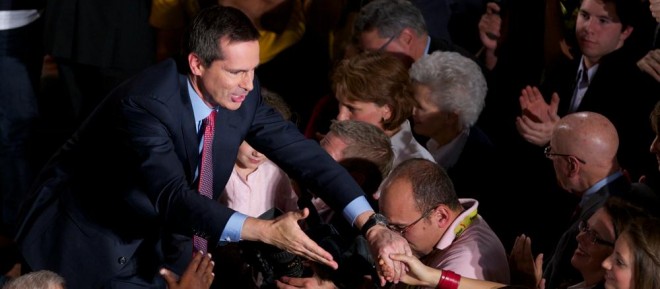Reality will bite back in Ontario
With little to no financial wiggle room, Ontarians shouldn’t hope for much from McGuinty
Share

The Twitterati in my home province of Alberta made a lot of hay this week over a headline in The Globe and Mail that presented the election of Alison Redford, a centrist former justice minister and now provincial premier, as an evolutionary step forward for the knuckle draggers of the Prairie politic. “Alberta steps into the present,” the headline read, to which the easily offended replied, “So where were we before, the past?” Albertans have an almost reflexive sensitivity to criticism from the East. It’s a bit like what the rest of Canada feels for the U.S., a mix of smug superiority and desperation to be noticed. But Albertans should relax. Ontarians seem to think worse of each other than of anybody else. And their politics, well, they’re nothing to brag about.
Take last night’s election. It was, in many ways, an odd campaign. In a province where health care eats up $46 billion a year, more ink was spilled on cross-dressing than on doctors’ salaries. Indeed, it seemed at times as if the parties had made a pact to avoid dealing with most of what a provincial government actually does. Health care? Untouchable. Education? Just keep the kissing booths out and we’re fine.
McGuinty came into the race about 10 points behind Tim Hudak’s Progressive Conservatives. In the only poll that matters, he got about 2 per cent more votes, enough to give him a third consecutive mandate, albeit a much reduced one. The Liberals captured 53 seats, one shy of a majority and more than a dozen less than they held before the campaign.
McGuinty ran on a stay-the-course platform. He promised no radical change. The economy, and his minority, should keep him to his word. In other words, as the Toronto Sun put it, ‘Ontario is now in HELL.’ (Incidentally, I’m not even sure what Sun Media stands for at this point. Sideburns? Yelling at dancers? Subsidizing arenas?)
The Sun exaggerates, grossly, as they always do. But McGuinty does face a series of very difficult choices, none of which will be made easier by the brokerage and balance of minority life. The Ontario government ran a deficit of more than $14 billion last year. Forecasts that have the province growing its way out of the situation are a fantasy, the kind kids have about playing in the NHL, the ones that might happen if everything goes absolutely right, but that should never, ever be banked on.
McGuinty or one of his successors, in other words, will have to increase revenue or decrease spending quite dramatically at some point. That’s hard enough to do with a majority. With a minority, it might be impossible. As for cutting taxes or raising spending, well, good luck to Ontario if it tries. If it succeeds, I might just move back to Redford-land. What’s more likely is that McGuinty will muddle through for the next few years, tinkering here and there without making any deep, structural change. It’s a rebound mandate, really, something to tide the province over while its people figure out where they want to go next.